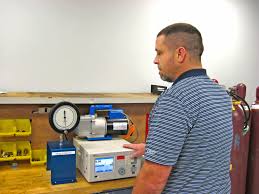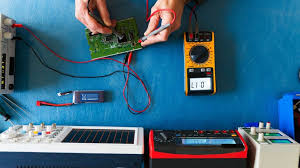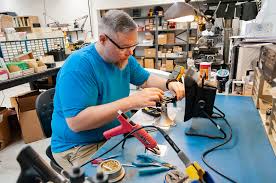Sensor calibration is crucial for ensuring accuracy and reliability in sensor performance. In Egypt, the optimization of sensor performance through calibration is gaining increasing attention due to the growing importance of sensors in various industries. Sensor calibration in Egypt involves the meticulous process of adjusting and fine-tuning sensors to ensure they provide accurate measurements and data. This article will electrical calibration lab explore the significance of sensor calibration in Egypt and how it contributes to the overall improvement of sensor performance in various applications.
Sensor calibration is a crucial factor in optimizing sensor electrical calibration services performance in Egypt. Through calibration, the accuracy and reliability of sensor measurements can be improved, ensuring that the data collected is precise and consistent. This is particularly important in various industries such as manufacturing, healthcare, and environmental monitoring, where sensor data is used for critical decision-making processes. In Egypt, there is a growing emphasis on the need for precise sensor measurements, leading to an increased demand for calibration services. Additionally, advancements in calibration technologies and methodologies have made it easier to perform regular calibrations, leading to improved sensor performance across various sectors in Egypt.
Understanding the Importance of Sensor Calibration in Egypt

Understanding the importance of sensor calibration in electrical instrument calibration Egypt is crucial for maintaining the accuracy and reliability of measurement devices. Properly calibrated sensors are essential for a wide range of industries, including environmental monitoring, healthcare, energy production, and manufacturing. In Egypt, sensor calibration is especially important for ensuring the safety and accuracy of critical systems, such as water quality monitoring, air pollution control, and medical equipment. Without accurate sensor calibration, there is a risk of inaccurate data, faulty equipment operation, and compromised safety standards. Therefore, investing in regular sensor calibration in Egypt is essential for ensuring the quality and integrity of measurement and monitoring systems.
Improving Accuracy: Sensor Calibration Techniques in Egypt
Cairo calibration services

Improving accuracy in sensor calibration techniques in Egypt involves using advanced equipment and software to ensure precise measurements. This may include regular maintenance and calibration of sensors, as well as implementing quality control measures to minimize errors. Additionally, training and educating personnel on proper calibration techniques is crucial for achieving improved accuracy in sensor readings. Continuous monitoring and adjustment of sensor performance is also essential to optimizing accuracy in various industries, ranging from manufacturing to environmental monitoring.
The Role of Sensor Calibration in Egypt's Industrial Sector

Sensor calibration plays a crucial role in Egypt's industrial sector by ensuring the accuracy and reliability of sensor measurements. Proper calibration of sensors is essential for maintaining quality control, complying with regulatory standards, and improving overall operational efficiency in various industries such as manufacturing, agriculture, and energy. In Egypt, industries rely heavily on sensors for monitoring and controlling various processes, including temperature, pressure, flow, and chemical concentrations. The calibration of these sensors is necessary to minimize errors and discrepancies in the measurements, thereby enhancing the precision and consistency of the data acquired. Moreover, calibrated sensors contribute to the optimization of resource utilization, reduction of waste, and enhancement of product quality. This, in turn, leads to cost savings, increased competitiveness, and sustainable growth within the industrial sector. Overall, sensor calibration is a fundamental aspect of ensuring the reliability and performance of measurement and control systems in Egypt's industrial sector, ultimately supporting the country's economic development and industrial advancement.
Challenges and Solutions: Sensor Calibration in Egypt's Environment
Challenges in sensor calibration in Egypt's environment include extreme temperatures, sand and dust particles, as well as high humidity levels. These factors can affect the accuracy and reliability of sensor readings. Solutions to these challenges include using robust and weather-resistant materials for sensor construction, implementing regular calibration and maintenance schedules, and employing advanced algorithms to compensate for environmental variations. Additionally, proper shielding and protection of sensors from direct exposure to the elements can also help maintain accuracy in readings.
Maximizing Efficiency: Sensor Calibration for Egyptian Technologies<
best calibration company Cairo/h2>
Maximizing Efficiency: Sensor Calibration for Egyptian Technologies is a comprehensive guide that covers the process of calibrating sensors used in various technologies in Egypt. The guide provides detailed information on the importance of sensor calibration, the different types of sensors used in Egyptian technologies, and step-by-step instructions for calibrating sensors to ensure optimal performance. It also includes best practices and tips for maximizing efficiency through sensor calibration, making it an essential resource for companies and professionals in the Egyptian technology sector.
Sensor Calibration: Enhancing Quality Control in Egypt
Sensor calibration is the process of adjusting a sensor to ensure that it provides accurate and reliable measurements. In Egypt, sensor calibration is crucial for enhancing quality control in various industries, including manufacturing, food and beverage, pharmaceuticals, and environmental monitoring. Properly calibrated sensors help to ensure that products and processes meet the required standards and regulations. This can result in improved product quality, reduced waste, and cost savings. Additionally, calibration helps to prevent costly equipment failures and production downtime, ultimately leading to increased productivity and efficiency. By regularly calibrating sensors, companies in Egypt can demonstrate compliance with industry standards and regulations, as well as maintain the trust and satisfaction of their customers. As a result, sensor calibration plays a vital role in enhancing overall quality control and ensuring the success and competitiveness of businesses in Egypt.
The Future of Sensor Calibration in Egypt: Innovations and Trends
The future of sensor calibration in Egypt is rapidly evolving with new innovations and trends. The increasing demand for accurate and reliable sensor measurement has led to the development of advanced calibration techniques and equipment. This includes the use of machine learning and artificial intelligence to improve the calibration process, as well as advancements in sensor technology for more precise and stable measurements. Additionally, there is a growing trend towards the use of wireless and remote calibration solutions, allowing for more efficient and cost-effective calibration processes. These developments are driven by the need for real-time monitoring and calibration of sensors in various industries, including manufacturing, energy, and automotive. Furthermore, the adoption of international standards for sensor calibration in Egypt is expected to further drive the advancements in this field. This will ensure that calibration processes and equipment meet global quality and accuracy requirements, and enable Egyptian industries to compete on a global scale. Overall, the future of sensor calibration in Egypt holds promising opportunities for innovation and growth, as well as greater precision and reliability in sensor measurement across various industries.